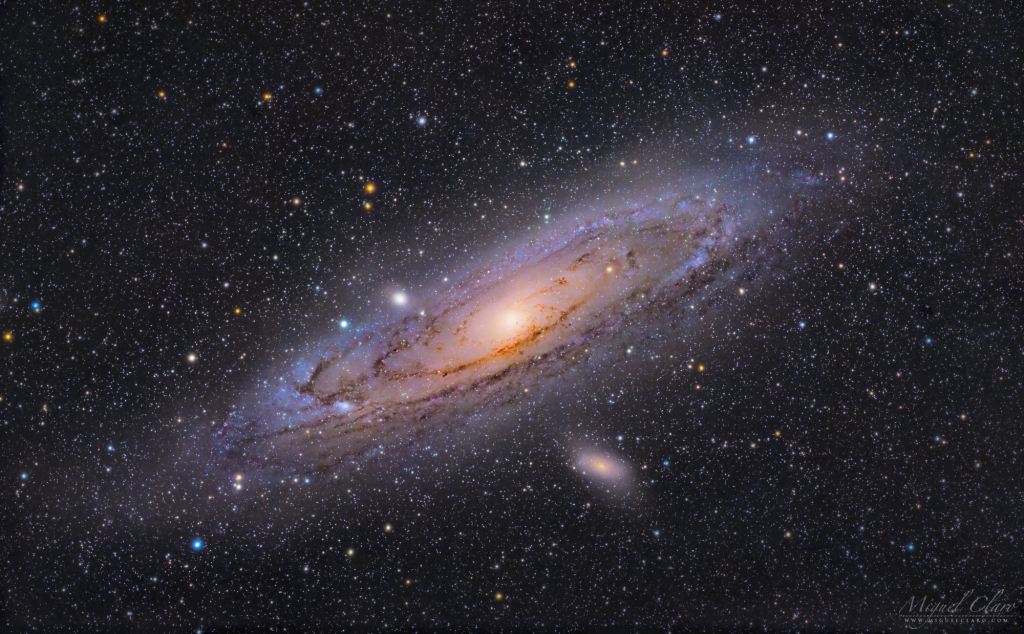My childhood home was on the edge of a large field in rural Ohio, and beyond my backyard there were no trees to block my view of the nighttime sky. Because my home was far away from the glow of a city, my nights were inky-black and the stars hung above me like jewels. On such nights, I’d grab my dad’s binoculars and climb onto our old garage, then lay back against the sloping roof and marvel at the sky. I cherished the solitude with the music of the seasons playing all around me. In spring I’d hear the peepers in the marshes, in summer I’d hear the chorus of crickets and the deep ‘galunks’ of monster bullfrogs calling from the ponds way beyond our property.
But above me, so unimaginably distant, were the stars which held me captive. I’d peer into the binoculars and be instantly lost, adrift on interstellar oceans light years wide. I’d wonder how differently the stars would look in the skies of other worlds, and I’d wonder if those worlds also had trees and wind and quiet nights or if they were different beyond any capacity I had to imagine. I’d always wonder if there were intelligent beings living way out across the heavens whom I could never hope to know. I’d always imagine one like me who was gazing from the roof of his garage in the same moment I was gazing from the roof of mine, each of us separated by a hundred trillion miles but looking in the other’s direction while locked in a state of wonder. I’d feel a bond with him just knowing he was exactly like me in his reverence for the night sky, and maybe some hope and love he felt for my faraway world, just as I felt for his.
The stars made quite a dreamer out of me when I knew nothing but the idealism of youth. Much has changed since then. I’d forgotten all about my stargazing friend across the galaxy until I started working on this essay. One day, maybe 40 years ago, I guess I just never thought about him anymore. I’m still enough of a dreamer to lose myself in a starry sky, but I’m kept sober by the very real problems of our age. There’s much less poetry in how I look at the world now, but much more critical thinking. It was a regrettable loss but for a much greater gain.
I still have no doubt there must be other life beyond our world. In a universe so large – with billions of suns in each of the billions of galaxies it contains – I find it impossible to believe that life only happened upon Earth and nowhere else, as our world’s religions more than imply. But I used to wonder why we seemed so alone. As a kid, I’d always heard the tales of alien spacecraft flying through our skies, and although I no longer believe in such things, I once wondered why I never saw any flying saucers from the roof of my garage.
In a book I read many years ago, I was introduced to The Fermi Paradox which addressed this very issue from the standpoint of science. It was named after Enrico Fermi, the brilliant Manhattan Project physicist who among other things, helped fashion the world’s first nuclear weapons. Fermi is thought to be the first to ask, “If life ought to be everywhere in the universe, where is everybody?” His paradox is still widely discussed and debated. It seems as if we shouldn’t be alone, but from all observations, we are.
Anytime we look up into our night skies, we confirm his paradox. If we’re patient, all we’ll see are occasional streaks of light from meteorites as they enter our atmosphere, or possibly some of our own satellites crossing the sky like tiny non-blinking aircraft. We never see any evidence of life beyond our world though. We never see flying saucers in our skies or making crop circles in our fields despite the dubious claims of attention-seekers or from those who are overly credulous. On the ground, nothing significant is ever captured in our giant radio telescope dishes as we listen for signals with intelligent origins.
How could this be so?
A google search of The Fermi Paradox results in more pages of text than most folks would ever want to read. All the explanations I’ve looked at make such perfect sense to me that I no longer regard it as a paradox. For one thing, extraterrestrial life forms (or ‘aliens’, as I’ll call them) would first have to know we’re here before having any desire to make contact with us. Unfortunately, our sun is not spectacular and attention-worthy in any way and there’s no reason aliens would even look in our direction. That dazzling ball of light in our sky is actually an average star, on the small side, and is neither especially bright nor especially dim. Although it means everything to us for the warmth and life it brings to our world, our sun is run-of-the-mill and would likely be lost in the glowing fog of other stars just like it which share the Milky Way Galaxy with us. Without some compelling reason to look our way, aliens simply wouldn’t know we were here.
If on the other hand aliens also had radio telescopes, it’s possible they could know about us. It’s possible they may actually be listening to our broadcast signals which have propagated away from our planet ever since our first wireless broadcasts were sent 115 years ago. Alien civilizations within 115 light years distance from us in all directions could actually be listening to every broadcast type we’ve ever produced… our early radio shows, our television re-runs and our nightly news programs complete with images of our great wars and calamities. It probably wouldn’t matter much if they did though, for what would be the chances they could understand our languages or the images they were seeing, given how very different from us they could be? And even if they could understand, how would they know with any certainty that our planet, hundreds of trillions of miles away and virtually invisible in the glare of the star it orbits, was the source of the broadcasts they intercepted? These reasons alone are sufficient to explain why we don’t see curious alien spacecraft floating about in our skies.
Let’s look at this in a slightly different way. Suppose curious aliens 100 light years away decided to send a signal deep into space in our direction. Suppose they just wanted to see if they’d ever get a reply from anyone who was ‘out there’. Suppose that after taking a full century to travel the 100 light years of distance, their signal was finally intercepted by our dish antennas and was instantly recognized as being distinct from the normal background noises we hear coming from the cosmos. Perhaps the aliens intentionally embedded a logical pattern within the signal so we’d know it came from aliens who were attempting so say hello. Now suppose we decided to send a reply message back to the same point in the sky from which their message originated. Maybe we duplicated the original pattern but also supplied the next elements which followed the sequential pattern they set up, all to basically say ‘we heard you’. We’d hit ‘Send’ and hope for an eventual reply, without ever knowing if the original messengers still existed. Our signal would travel outward from our antenna and would arrive 100 years later in same approximate region where the original message was sent. If the aliens were to intercept it and immediately reply again, we’d have to wait another century to hear if they had anything more to say. In all, two full centuries would elapse before the aliens learned of our existence, and two full centuries would elapse before we received a reply to our own message. What can happen to worlds in two centuries? How different was our own world 200 years ago in 1821?
In reality, any messages we received or sent in reply would be more thoughtfully considered, longer in duration and far richer in information to study. This was a simple scenario to make the point that for each journey the signals would take, a century of time would pass in this particular case of 100 light years of distance. A century is a long time in terms of human lifetimes, and possibly in terms of the lifetimes of the aliens who originally sent the messages. There would be great complications in conversing across many light years. Depending on the distances involved, those conversing are likely to die before any of their messages or replies could ever be heard. In the meantime, many things can happen on the home planets of the correspondents. Priorities can change. Funding for scientific projects can end. Natural disasters, political upheavals and great wars can destroy civilizations or at the very least, change the forms of governments. It’s very possible that any return signals would find no radio telescope dishes to collect it, or just as bad, no desires whatsoever to listen.
All those complications aside, we keep listening here on Earth because even a first message would be the greatest discovery our species could ever make. Unfortunately, all we’ve ever heard to date is the usual background noises of explainable phenomena in the cosmos. This is why The Fermi Paradox is sometimes regarded as The Great Silence.
The more one reads about the The Fermi Paradox, the more variations one finds in its explanations. Maybe aliens somehow do know we’re here but couldn’t care less. Curiosity may be a human trait, but it’s not necessarily an alien trait. Maybe they’re completely indifferent to the idea of other life forms in the universe. Maybe other alien life forms have no technology. Maybe they’re early hunter-gatherers still using stone tools, with metallurgy, followed by technology, still hundreds of thousands of years into their futures. Maybe they have no science and are guided only by religious doctrine or superstition.
In my view, the most likely explanation for our being ‘alone’ in the cosmos is a very simple one which makes perfect sense. We are isolated and alone in the universe because the distances between stars and galaxies are too great to be traveled in any way.
Even at the incredible speed light travels – 186,282 miles per second – distances in the cosmos are so incomprehensibly vast that journeys would last far beyond the lifetimes of human or alien astronauts… and this is true even while supposing that light speed could be reached by space ships, which they absolutely cannot. It takes at least a hundred thousand years for light to cross our galaxy and another two and a half million years to reach the galaxy nearest to our own. From there it only becomes more challenging to contemplate as objects in space become dramatically more distant.
Traveling at a mere 28,000 miles per hour – which is a very impressive speed by earth standards – Apollo astronauts took 3 full days to reach our moon, a trip which a photon of light could make nearly 47 times in only a minute. In a full year, light travels nearly 6 trillion miles (or the unit of distance we call a light year.) It would take Apollo astronauts nearly 27 thousand years to travel one light year in their Command Module spacecraft. A journey to our nearest star would take them 114 thousand years, and a journey across our galaxy would be practically eternal at 3 billion years. Only that staple of science fiction books and movies, the Hyperdrive, could make interstellar and intragalactic travel feasible. Unfortunately, Hyperdrives are only found in science fiction as they’re not permitted by Einstein’s Special Theory Of Relativity and his famous E=MC^2 equation, not here or anywhere else in the universe. To me, this effectively ends nearly all discussions about The Fermi Paradox, except for one aspect which has stuck with me since reading that book so many years ago. It’s the one we call The Great Filter.
The Great Filter proposes that once a civilization reaches a sufficiently advanced level of technology, it inevitably causes its own extinction through the misuse of or the inability to control that technology.
It suggests that the reason we seem so alone in the universe is because there’s nobody left but us. They’ve all destroyed themselves. And the uncomfortable implication is that we, ourselves, may be next.
I’ll write about The Great Filter and what it could mean for our world in my next essay.






Leave a comment